No products in the cart.
Menu
In this July blog post, I aim to dive into the world of sunblock, UVA, UVB, natural remedies for sunburn, and essential summer skincare tips. With the scorching heat and humidity in New York, it's crucial to share some valuable insights. Summer demands extra care for your skin; the sweat and pollution combo isn't exactly friendly and could lead to breakouts, clogged pores, acne, and more.
Prioritizing Skin Cleansing in the Summertime
In the quest for healthy, glowing skin, proper cleansing plays a pivotal role. Especially during the summertime when our skin is exposed to more environmental elements, maintaining a consistent and effective cleansing routine is crucial. Here's why you should prioritize skin cleansing and some tips tailored for the summer season:
Why is Skin Cleansing Vital?
Tips for Summer Skin Cleansing

By prioritizing skin cleansing and adapting your routine to the changing seasons, you can maintain healthy, radiant skin throughout the summer. Remember, consistency is key in skincare, so establish a cleansing regimen that works best for your skin type and needs.
UVA and UVB in Sun Protection
UVA and UVB are types of ultraviolet radiation emitted by the sun that can have various effects on the skin. Here's a brief overview:
Both UVA and UVB exposure can contribute to skin damage and increase the risk of skin cancer. It's essential to use broad-spectrum sunscreen that protects against both UVA and UVB rays to maintain healthy skin and reduce the risk of sun-related skin issues.
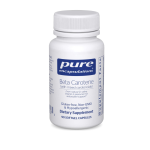
Taking Beta Carotene during the summer is beneficial because it enhances skin protection against UV damage, promotes an even tan, and provides antioxidant support to combat free radicals, thereby maintaining healthy skin.
When it comes to shielding your skin from the sun's harmful rays, the debate between sunblock and sunscreen often arises. Let's delve into the nuances of these two sun protection products in this short blog post:
Sunblock vs. Sunscreen: Understanding the Difference
Sunblock:
Physical Barrier: Sunblock typically contains minerals like zinc oxide or titanium dioxide, which act as a physical barrier to reflect UV radiation away from the skin.
Broad-Spectrum Protection: It provides broad-spectrum protection against both UVA and UVB rays.
Thicker Consistency: Sunblocks tend to have a thicker consistency, which can leave a visible white cast on the skin.
Sunscreen:
Chemical Absorption: Sunscreens contain chemicals that absorb UV radiation and convert it into heat, offering a different mechanism of protection.
Varied SPF Levels: Sunscreens come in a range of SPF levels, offering options for different levels of sun exposure.
Lightweight Formulas: They usually have lighter formulations that are easier to apply and blend into the skin without leaving a white residue.
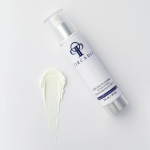
Which One Should You Choose?
The choice between sunblock and sunscreen often boils down to personal preference and skin type.
Sunblock is great for sensitive skin or for prolonged sun exposure as it creates a physical barrier.
Sunscreen is more cosmetically elegant and may be preferred for daily wear due to its lightweight feel.
Remember, regardless of your choice, the most important factor is proper application. Reapply every two hours and after swimming or sweating to ensure effective sun protection.
Tips for Treating Sunburn
After enjoying some time in the sun, dealing with sunburn is not uncommon. Here are some effective tips to help treat sunburn and promote skin healing:
1 - Sour Cream Soothing
Surprisingly, sour cream can be a soothing remedy for sunburn.
Lactic acid in sour cream helps reduce redness, inflammation, and skin irritation.
2 - Enhanced Relief with Aloe Vera
Add aloe vera gel to sour cream for enhanced soothing effects.
Aloe vera offers cooling and healing properties, providing relief from sunburn discomfort.
3 - Arnica Assistance
Consider arnica-based creams or gels to ease sunburn symptoms.
Arnica, a natural anti-inflammatory herb, can help soothe the affected skin.
4 - Stay Hydrated
Drink plenty of water to keep your body hydrated.
Proper hydration promotes skin healing and recovery from sunburn. Love to eat watermelon
5 - Cool Showers
Take cold showers to cool down the skin and alleviate sunburn discomfort.
Avoid hot water, as it can aggravate sunburned skin.
6 - Aloe base Moisturizer
Hydrate your skin with aloe vera base or a gentle body moisturizer.
Moisturizing aids in repairing sun-damaged skin and promotes healing.
Ildi's product selection to assist with Sun-damage
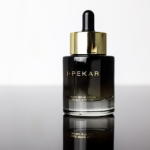
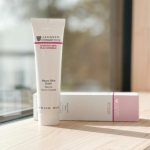
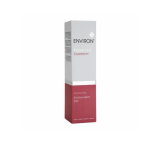
Remember, prevention is key in protecting your skin from sunburn. However, in case of overexposure, these tips can provide relief and support healing. Prioritize your skin's health and well-being by taking care of it properly.
If you seek additional skincare advice or have specific questions about sunburn treatment, feel free to reach out for more guidance. Your skin deserves the best care!
XOXO, Ildi
If you’ve ever battled dry, flaky skin during the winter months, you know it’s not just a minor annoyance. It can feel like your face is staging a full-blown protest against the cold, dry air. And if you live somewhere that gets especially chilly, you know exactly what I’m talking about. The struggle is real. But […]
Happy New Year! As we step into 2025, it’s the perfect time to reflect, set new goals, and focus on what truly matters—ourselves. Every year, I write about two main topics, but this time, I want to expand and dive deeper into something I believe is incredibly important: self-care. Too often, we push ourselves to […]
As December blankets New York City in its frosty embrace, it marks more than just the end of a year—it’s an invitation to slow down, reflect, and at Ildi Pekar studio we believe true beauty and wellness come from a harmonious relationship between your body, mind, and spirit. This month, let’s explore how we can […]